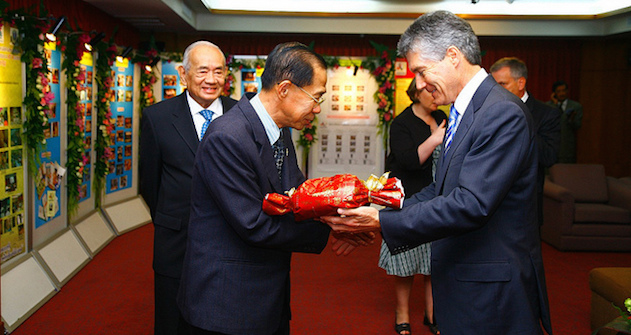The Thais That Bind Us: 10 Years After TAFTA

Ten years after the introduction of a free trade agreement, Thai-Australia relations are at an interesting new juncture.
1 January 2015 will mark the 10th anniversary of the Thailand-Australian Free Trade Agreement (TAFTA). Over this time the relationship between the two countries has grown in all areas: trade, the movement of people, education and defence cooperation.
TAFTA’s immediate impact on trade was significant; tariff reductions on thousands of items enabled Australian exports to Thailand to double within 18 months. In the period 2004 to 2010 trade between Australia and Thailand increased 20% annually, while Australia’s total trade with the rest of the world grew by only 12%. Trade between the two nations is now worth over $19 billion and Thailand represents Australia’s eighth-largest trading partner (in terms of goods and services) and is its second-largest in ASEAN.
TAFTA also encouraged foreign direct investment (FDI) in a variety of sectors in the Australian market especially energy, food and agribusiness. In 2006 Thai investment stock was valued at $338 million. However, this jumped to $7.3 billion in 2012. According to Austrade, the level of Thailand’s FDI has increased more than any other of Australia’s 20 largest investors.
The relationship is not necessarily a balanced one. The level of Thai FDI in Australia is more five times that of Australian investment in Thailand. Australian investments in Thailand are characterised by relatively small projects in the manufacturing and professional services sectors while it is large energy and agricultural ventures that dominate Thai activities in Australia. These include coal mines and wind farms in NSW and a sugar plant in Queensland. Australian firms currently face a series of challenges when wishing to do business in Thailand; these include a lack of skilled workers, as well as infrastructure and logistics costs. The asymmetry continues in regards to merchandise trade and trade in services; the value of imports from Thailand is approximately three times that of Australian exports.
The Thai-Australian relationship is not only characterised by the movement of goods and services, but also of people. Currently more than 900 000 Australians visit Thailand every year and, according to the latest census figures, over 45 000 people of Thai heritage call Australia home. Sydney plays host to the 2nd largest Thai expatriate community in the world after Los Angeles.
Australia continues to be a leading destination for Thai students with over 20 000 students studying here in 2013. The New Colombo Plan and the Australia-Thailand Young University Researchers’ Exchange Programme have created opportunities for young Australians to study in Thailand. The latter sent the first of 10 Australian researchers to Thailand this year and represents a new level of cooperation between the Office of the Higher Education Commission in Bangkok, Australia’s Department of Education and an Australian organisation, the Innovative Research Universities Group. Funded by the Australian government, the New Colombo Plan aims to support Australian undergraduates studying at universities throughout the Indo-Pacific region
Australia is no longer a provider of development assistance to Thailand as, in November 2003, Thai prime minister Thaksin Shinawatra announced that his government would no longer be accepting foreign aid from 2004 onwards. Funding and grants are still available for human rights NGOs and scholarship programs.
Dating from 1945, defence represents another area of bilateral cooperation. Originally the focus was on the repatriation of POWs and the recovery and re-burial of Australian nationals who had perished on the Siam-Burma Railway. However, since then the relationship has developed between Thai and Australian soldiers serving together in UN missions from South Korea to East Timor.
Annual talks between defence policy makers have been running since 1990 with the express purpose of promoting cooperation on regional security matters. More recently, in August 2014, the Royal Thai Air Force joined the RAAF’s Exercise PITCH BLACK held in the Northern Territory.
The ties that bind these two nations are numerous and diverse but it would appear that Australia is not benefitting as much as it could from the relationship. While real challenges continue to obstruct greater levels of investment (such as the aforementioned logistics and workforce issues), according to DFAT and Austrade, some of the barriers exist largely in people’s imaginations. These include views that Thailand is a poor and underdeveloped country, politically unstable, and suffers from high levels of corruption.
Despite its recent political turmoil, Thailand was labeled one of Bloomberg’s best emerging markets in 2014 and, in terms of ease of doing business, Thailand currently outperforms all of its ASEAN neighbours, with the exception of Singapore and Malaysia. Furthermore, Austrade has stated that all major parties have a pro-business and pro-market stance.
While Thailand’s GDP is undoubtedly lower than Australia’s, its middle class now numbers 12 million, similar to Malaysia and over 4.5 times that of Indonesia. The appetite for high quality manufactured goods is strong and growing every year. To ignore their spending power would therefore be unwise. Austrade does recognise that corruption, especially in the state sector, is an issue but it is interesting to note that Austrade believes that the massive private sector is largely corruption free. Indeed, David Robinett, senior private sector development specialist at the World Bank has stated, “Thailand is a clear leader in corporate governance among Asian economies and emerging economies”.
The challenge for Australian businesses is to build on the foundations that TAFTA has laid and to take greater advantage of the opportunities that it presents in order to make the next decade a more prosperous one.
Eleanor Walsh is a research intern at the AIIA National Office. She can be reached at elewalsh@hotmail.com. This article can be republished with attribution under a Creative Commons Licence.


